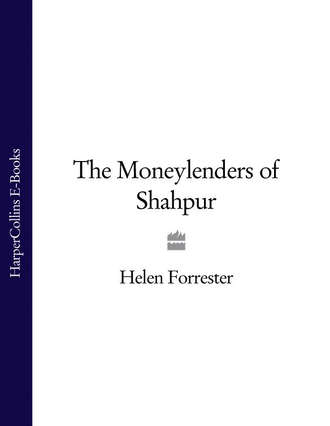
Полная версия
The Moneylenders of Shahpur
John lay resting on his wooden couch and laughed at Ranjit. He lay on his back, with one muscular arm curled round his head, and Ranjit, as he watched him, thought that he must be much taller than he seemed when standing. When on his feet, he tended to stoop and put a lot of weight on his stick. A strong man, however, and very virtuous, though, in Ranjit’s opinion, he was too young to live in quite the sagelike manner that he did.
‘It defeats me, Ranjit,’ remarked John, ‘how you manage to find out all these things.’
‘Sahib,’ replied Ranjit primly, ‘I do but listen to the conversation of others. Ramji told me himself that Mrs Tilak upbraided him personally because, she said, the lavatories were filthy, and, you know, Sahib, that he does his best to clean them.’
John thought of Ramji’s apathetic efforts at cleaning, and snorted.
‘And anyway, Sahib, what else does one expect a lavatory to be except very dirty?’
‘Ours is clean,’ said John, yawning and stretching like a cat.
‘You clean it yourself, Sahib,’ said Ranjit disapprovingly.
‘If I left it to you and Ramji it never would be clean.’
He rolled over to face Ranjit and his eyes were suddenly a little flinty.
‘Why should one not clean one’s lavatory, may I ask? Gandhiji set everyone a good example by taking a sweeper’s broom and doing a sweeper’s work.’
‘I am a Brahmin, Sahib, and well versed in the scriptures.’
‘You cook for me.’
‘True, Sahib – but times are changing and I must change with them,’ said Ranjit huffily, fingering the little shikka on his head. His grey hair was thinning rapidly, but he cultivated carefully this precious tuft of hair by which God, in due course, would pull him up to Heaven.
John abandoned what he knew to be a useless argument and swung his legs down to the floor.
‘Let’s look at the account book,’ he said. ‘It’s time we did.’
Ranjit heaved a sigh and produced from his shirt pocket a much thumbed notebook, in which were entered in Gujerati characters the various expenditures of their small household. John ran an experienced eye down the list, to make sure that not overmuch of any one item was being used; occasionally, Ranjit’s hospitality to his family extended to gifts of tea or sugar out of John’s store, as well as free meals.
Meanwhile, Ranjit took out of his shirt pocket a dirty screw of newspaper and from this extracted three rupee notes and a handful of small change, which he carefully counted out on to the floor in front of the couch. John checked the amount with the book and found it balanced. Satisfied, he returned the housekeeping book to Ranjit, heaved himself up and unlocked the almira, took out his cash box and went back to the couch.
Without thinking, he sat down cross-legged and was surprised that he could arrange himself in that position without pain. Ranjit held out an incredibly wrinkled brown hand and John counted his wages into it. He then gave him money for a week’s supply of food and fuel.
The servant folded the notes up carefully and stowed them away in a grubby handkerchief, after which he sat looking rather gloomily at a small line of ants marching across the floor, until John asked him, ‘What’s the matter, Ranjit?’
‘Sahib, you have thousands of rupees in the bank and yet you live like a monk. It is not fitting, Sahib, for an Englishman to live so. You should have a pukka bungalow with a compound – and a mali to cultivate the garden – and a kitchen boy to help me.’
‘Ranjit,’ said John with a sigh, ‘you should be in the Secret Service. Do you by any chance know the exact amount of my bank balance?’
Ranjit flushed under the implied reproof, though he answered steadily, ‘Yes, Sahib. Rs. 40,581, As. 3.’ He cleared his throat, and went on, ‘Further, Sahib, you will soon get another letter from Wayne Sahib, your book man in America, with more money; and you have two wealthy students to coach here – more money!’
John leaned back against the wall and roared with laughter.
‘You know more about my finances than I do,’ he said.
‘The Statement from the bank lies on your desk,’ replied Ranjit blandly.
The idea of launching out on to a sea of housekeeping appalled John; he liked his present existence. It was comparatively uncomplicated, he had plenty of learned men for company, and for a change he could take an occasional trip to Abu or Delhi or Bombay, without having to worry about the cost of it. Already Tilak and Miss Armstrong had stirred in him a faint premonition of unwanted change, and here was Ranjit lecturing him about rearranging his life. A sharp reproof rose to his lips, but he stifled it hastily – Ranjit cared more about his wellbeing than anyone else.
‘I’ll think about it,’ he told Ranjit gravely, and dismissed him.
He sat down at his desk and commenced reading the notes he had made on the Marwari Gate temple.
The evening was approaching and there was a comfortable clatter of saucepans from Ranjit on the veranda. Behind it John could hear the wind whining among the bungalows and University buildings. He rose and stretched. Balancing himself by holding on to the furniture, he went to the door and opened it. The sky was flushed with sunset, the pinkness dulled by the threat of storm in it.
His landlord’s grandchildren were playing, as usual, in the compound, and the smallest child was in the act of unlatching the compound gate. As he watched, it managed to heave the gate open and peep through it, and then ventured outside. John called to it to come back but it did not, so he got his stick and walked as quickly as he could to the gate.
The toddler was sitting in the middle of the lane cooing to itself, while a small black carriage, drawn by a single horse, bowled smartly towards it.
As he went to retrieve the child, he shouted a warning to the driver. He pulled the youngster to its feet and, with a pat on its behind, sent it back through the gate. He paused himself, because the awkward bending had hurt his legs. The mangy horse drew up by him, and its owner leaned down from beside the driver.
Mahadev Desai smiled and bowed. ‘Good evening, John. Can I give you a lift anywhere? Nice to see you.’
John surveyed the plump speaker through the dust engendered by the carriage. He had known Mahadev casually for most of his life. He was the son of a powerful moneylender and jeweller; but today he wore, like any fairly prosperous businessman, a plain white cotton shirt, jacket and trousers. A white Gandhi cap surmounted a moonlike, though not unhandsome, face. Shrewd eyes stared unblinkingly, while he awaited John’s answer. Behind him, sat his younger brother and sister-in-law, who murmured ‘Namuste’ in greeting.
‘No, thanks,’ replied John. ‘I called to you, because I wasn’t sure if your driver had seen my landlord’s grandchild – the little tike had strayed into the lane.’
‘I saw him, Sahib,’ the driver interjected hastily, lest he be blamed for carelessness.
John nodded, and inquired after Mahadev and his family. The cadences of the man’s voice, he thought, had not changed over the years. He knew the nervous respect with which Mahadev was treated in the city. The Desai Society in which he lived was nearly in the centre of the old town, and from it, financial tentacles stretched out into the mills and homes of half the city, even as far as Delhi and out to Europe, it was said. Nobody held more mortgages and family jewellery in pledge. Nobody could put pressure on a hapless debtor faster than the Desais, or produce a bigger bribe when needed. Their knowledge of invective, that priceless asset of any Indian moneylender, had not been lost as their business became enormously expanded. John had heard Mahadev himself, before he had taken charge of their business in France, screaming in the bazaar at some unfortunate businessman, while a crowd gathered to see the fun, and the police vanished.
Desai was speaking to him.
‘I am going to catch the Delhi Mail, after calling on Dean Mehta,’ he confided in a slightly pompous whisper.
‘Indeed,’ said John absent-mindedly, his thoughts already wandering back to his book. ‘A pleasant journey.’
‘Thank you,’ replied Desai graciously. ‘A-jo.’
‘Goodbye,’ said John, stepping back as the driver, in response to a gesture from Desai, whipped up the horse.
John went slowly back into the bungalow. The children had gone in for their evening meal. The wind still whined its threat of a dust storm.
He went back to his desk and looked again at his sketches of the Dreams of Trisala, so often meditated upon by Jain women. He saw instead the ivory-coloured face of Mahadev.
The wife of one of his father’s old friends on campus had told him that the well-known moneylender was considering remarriage; as one of the richer men in Shaphur he was of interest. His first wife, she said, had died in childbirth and, soon after her death, he had been sent by his father to Paris, presumably in connection with their business in fine jewellery. Rumour had it that he had opened an elegant jewellery shop there, where they sold silver filigree and other Indian-designed ornaments. By all accounts, this venture had thrived well.
Now Mahadev was home again and, perhaps because of his hairstyle, looked rather Westernized. He was not so influenced, however, that he had lost the ancient instinct of a moneylender to hide his wealth; he was still dressed quite humbly and drove a half-starved horse.
John smiled to himself, as he remembered Ranjit’s description of why Mahadev Desai was being encouraged to look for another wife.
‘It is well known, Sahib,’ Ranjit had said, ‘that the older Desais fear greatly that Mahadev may take a French woman to wife – France is next to England, isn’t it, Sahib? And there has already been enough trouble in the Desai Society.
‘The Society was quite happy when ruled by Mahadev’s mother and father, and his little daughter blossomed in spite of the lack of a mother. But when the old lady died and that shrew of a younger sister-in-law became the eldest lady, then, Sahib, trouble seemed to spread from house to house inside their compound. The cousin brothers went away because their wives would no longer stand the ceaseless nagging. Then the wretched woman complained to all the neighbours that she was worked to death, because there was no other woman in the house – though they do have a number of servants, Sahib.’
Ranjit had stopped to blow his nose into a corner of his handkerchief which was not knotted round the housekeeping money, and had then gone on disparagingly, ‘Trust them to think of the most economical thing to do – they are persuading Mahadev that he must marry again.’
CHAPTER FIVE
As Mahadev continued on his way to visit Dean Mehta, he mused on the charms of his possible future wife.
He wished to marry for reasons other than economy. He had discovered, to his cost, that a well-to-do Indian jeweller, alone in Paris, could be quite popular amongst women; and their bare legs and tight dresses had been a constant temptation, to which he had, too often, succumbed.
He thought that an educated Indian wife might keep him out of further mischief; he could take her on his travels. He also passionately desired a son. He was fond of his little daughter, but, all too soon, she would grow to marriageable age and leave him, whereas a son would be a joy to him all his life.
For different reasons, the older Desais were of the same mind. Mahadev had hardly distributed the gifts he had brought from France several weeks before, when, with sly hints, the matter was broached. Girls of suitable caste and orthodoxy were suggested; Mahadev found fault with all of them.
‘It looks as if our French investment will flourish,’ he reminded his father, ‘so it is important that I should have a wife able to mix with French ladies.’
‘French women!’ exclaimed his father. ‘She’ll live in this house. She doesn’t have to go with you to Paris.’
Mahadev felt the perspiration trickling down his back. He did not know how to explain to his father the witchery of the women he had seen in France. The amount of sin he had accumulated during his visit appalled him; somewhere, sometime, it would have to be expiated.
‘It’s the custom in France to travel with one’s wife,’ he lied in desperation. ‘It’s expected of one.’
His father digested this information in silence. He was aware of the pitfalls of travel. There was the temptation to eat meat, for example.
As if reading his thoughts, Mahadev said, with a burst of inspiration, ‘It’s extremely difficult to eat properly without someone to cook for me.’
‘Ah,’ exclaimed his father, satisfied at last. ‘Most of the girls whom your uncles mentioned can read and write. They’d be docile enough and do whatever you asked.’
Mahadev mentally dismissed the whole solemn, dull collection of them. He had seen a woman walking, with her boy servant, near the University. He had known her for years by sight. He remembered her long plait of hair swinging softly over pretty, rounded shoulders, her delicate ivory skin, her demurely lowered eyelids. Swallowing hard, he inquired of his father, ‘Did Dean Mehta’s daughter ever get married? Her father’s with the University – you may remember him.’
Old Desai looked at him. ‘She’s not one of our people.’
‘I know,’ replied his son, rather crestfallen. ‘But she is a Jain.’
Desai Senior pursed his thin lips, and considered the merits of the match. Finally, he said uneasily, ‘She’s not a lucky woman – she’s been bereaved even before being married – and her horoscope may not be correct.’
Mahadev dared not show the irritation that he felt, neither could he describe the subtle seductiveness of Anasuyabehn or say that he had thought her beautiful long ago, when he was a young man and she was a quiet school girl travelling to and from her lessons. He had never questioned his father’s choice of his first wife, who had been a good, obedient girl, but now Mahadev was no longer young – he was a rich, experienced man who hungered for a woman of his own choosing. He wanted Anasuyabehn, the sight of whom made him tremble. And of what use was being rich if one could not buy what one wanted?
The elder Desai listed a multitude of reasons regarding Anasuyabehn’s unsuitability as a wife, but they only hardened Mahadev’s determination to wed her.
‘Perhaps eldest aunt from Baroda could inquire discreetly about the horoscope,’ he said, trying to keep his face impassive.
His father looked at him penetratingly. Mahadev seemed set upon this woman, and he himself was very anxious to see him safely married. Mahadev was his favourite son; in comparison, his younger son was a dunderhead – and the boy’s wife was an avaricious shrew. He wondered what kind of a temperament Anasuyabehn had; something about her evidently pleased his son.
‘Have you spoken to this girl?’
‘No, father.’
‘Have you seen her?’
‘Yes, father. Many times since childhood. She used to go to a school near the Red Gate and I would see her getting off the bus at the flower bazaar with the other girls.’
‘Hm,’ murmured his father, thinking that young men did not change much from generation to generation. ‘I’ll consult your uncles.’
The elder man waved his hand in dismissal, and Mahadev knew intuitively that he had won. He got up from the mattress on which he had been sitting, bowed and made for the door.
‘Wait,’ said his father, and Mahadev turned apprehensively.
‘You realize that a man in your position can choose almost any girl in our caste – parents would happily approve of you.’ He paused, and then went on, ‘You should consider this carefully, for I do not know whether the Mehtas will be so happy. Dean Mehta presumably has had other offers for his daughter.’
Mahadev, secure in his family’s financial empire, had never thought of being snubbed by Dean Mehta and he was nonplussed for a moment, and then said, ‘Would Baroda aunt cause inquiry to be made on this point first?’
He is quite determined, thought his father fretfully. I should be firmer about it – and yet the other boy is very unhappy with his witch of a wife.
‘Very well,’ he said grudgingly. ‘Here, take these photographs and have another look at them – you might change your mind about one of them – Baroda aunt’s young sister-in-law looks quite nice.’
Mahadev reluctantly took from him the half dozen or so studio portraits of prospective wives, promised to consider them and made his escape.
A man of thirty-four, who had seen the world, he fumed, should surely be allowed to choose a wife; and yet, beneath his resentment at his marriage being arranged for him, lay the knowledge that his father was being extremely patient.
He wandered into the compound, round which were ranged dwellings dating back a hundred years or more. How crowded and dirty it looked! Its smoke-blackened stone verandas with their steps hollowed out by generations of feet, its rotting woodwork, its lack of paint, depressed him. Later on – he would not admit to himself that he meant when his father and his Partner Uncle died – he would build a new Society in a more salubrious neighbourhood, and leave this compound to his brother.
Now that India had settled down after the horrors of 1947, others, less rich than he was, had moved out; he would, too. He sighed, and looked at his watch. Time to go into the office and relieve his brother.
In the gloomy, dusty office, his brother was haggling superbly with a rather cowed local landowner about a loan against his next crop. Mahadev went to stand quietly by him.
His father might consider Younger Brother dull and commonplace, but Mahadev was fond of him and felt he would make an excellent junior partner, completely reliable in all routine matters, and, as far as the family was concerned, painstakingly honest. It was a pity that his father was so hard on him.
Gradually, Mahadev was drawn into the argument, and in a very short time he was engrossed in squeezing a higher interest rate out of their client.
The would-be brides soon had an account book banged down upon their neatly photographed features – and were forgotten.
CHAPTER SIX
Anasuyabehn’s widowed aunt had made her home with her brother and his daughter because she had no sons and disliked the idea of living with one of her brothers-in-law. She had constantly berated the old scholar about his neglect of his daughter in respect of finding a husband for her. The only reply she had been able to obtain from him had been, ‘We should wait a full two years from the time of her betrothed’s death – it is not judicious to hurry the girl.’
As a result of this, Aunt had almost given up hope of ever seeing her niece married, since the older a girl became the harder it was to marry her off. Aunt felt that her own abilities as a matchmaker were simply withering away.
She had, therefore, been delighted when, by devious routes, it was made known to her that the Desais would make an offer for Anasuyabehn, if they could be sure of not being snubbed. This was an opportunity which could not be ignored, a real test of her matchmaking skills, which would benefit dear Anasuyabehn immeasurably. She consulted nobody, but assured the lady from whom this indication had come that such an offer would be well received. She was overwhelmed by the idea of being the instrument by which such a wealthy alliance could be brought about; it would crown all her previous successful efforts on behalf of other relations. After this, all her female relations with children to marry off would crowd about her, begging her favours on behalf of their offspring. Her thin, hooked nose quivered at the anticipation of her future importance in the family.
She conveniently forgot the difference in caste. She thought only of the Desai bank balance and willingly became the mediator between the two fathers. Two other offers for Anasuyabehn from the parents of poverty-stricken scholars were left to die from neglect on her part.
When she first broached the subject, Dean Mehta looked up from his book, said flatly, ‘No,’ and returned to his studies.
Undeterred, she continued to sit in front of him, chewing her thumb. He again glanced up, and added, ‘I’ll advertise for a husband for her in early spring.’
‘The girl is already twenty-four years old.’
‘I know, I know,’ said the Dean testily, ‘but Desai is not a Mehta.’
‘He’s near enough,’ said his sister, ‘and he’s rich, healthy and in love with her. What more could we want in these changed times?’
‘Does Anasuyabehn know Mahadev?’ asked the Dean suspiciously. It would, he thought, be quite easy for her to carry on an intrigue without his knowledge – after all, she occasionally went shopping or to visit a friend by herself.
‘No,’ said Aunt decisively. ‘Someone would have seen her and told me, if she had ever spoken to him.’
The Dean sat silently at his desk for a few minutes, staring out of the heavily-barred window and idly twiddling his fountain pen. He reviewed carefully all he knew of the recent history of the Desais, the hints he had heard of their holdings in many new enterprises, their influence amongst Government officials, Mahadev’s travels. At last he said, ‘Discuss the Desais with Anasuyabehn. She’s old enough to be consulted.’
His sister hid her satisfaction at this reply, and merely said, ‘All right.’
Her bare feet made a soft brushing sound on the stone floor as she shuffled off to the kitchen, ostensibly to consult Anasuyabehn.
The Dean continued to think about the Desais. Except on grounds of caste, there could be no reasonable objection to the match, and for years he had been preaching that Jainism had originally been a revolt of the Kshatriya military caste against their overbearing Brahmin priests; there was no caste among the original Jains. Young Desai was reasonably educated, had a good, though old, house and was certainly rich; his trips to Europe would have broadened his outlook and, indeed, these days, the family seemed to be financiers and jewellers rather than orthodox moneylenders.
It was said that Mahadev’s father was ailing and his uncle was very old, so it would not be long before Mahadev became the head of his communal family. Further, in less than twelve months Dean Mehta would himself retire, and he dearly wished to give himself to a life of contemplation – to become a monk; he had for some years been quietly directing his life towards this goal by study, fasting, confession and the taking of those vows permitted to a layman. To have Anasuyabehn settled now might mean that he would see a grandchild before he severed all earthly relationships by taking his final vows.
He re-opened his book and composed his mind again for work.
‘We’ll see what Anasuyabehn has to say,’ he decided.
Aunt, meanwhile, had sat in a corner of the kitchen and helped to prepare vegetables, while she considered what to say to Anasuyabehn.
The kitchen was quite modern. It had a water tap and beneath it, on the floor, had been built a low, stone enclosure to confine the splashes from it and guide spilled water down the open drain. The walls were whitewashed and, on a built-in shelf, glittered the brass cooking utensils. A watercooler reposed on a stand in a corner near the casement window, and huge double doors, which led on to a veranda, stood open to let in the morning freshness before the real heat of the day began.
‘Take the new box of charcoal outside,’ Anasuyabehn said to her little servant, ‘and brush it.’
The boy picked up a small handbrush and the box and obediently went out into the compound, where he could be heard happily talking to a squirrel, as he gently went over each piece of charcoal with the brush to make sure that no insect was accidentally burned when the fire was lit.
Aunt seized the opportunity to say, ‘I saw Mahadev Desai this morning.’
‘He’s been away a long time,’ said Anasuyabehn. ‘I don’t suppose many people will be glad to see him. He drives even harder bargains than his elders, I’m told.’










